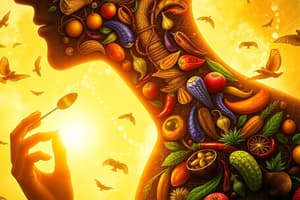Podcast
Questions and Answers
What is the process of obtaining and utilizing energy and nutrients from food?
What is the process of obtaining and utilizing energy and nutrients from food?
- Respiration
- Transportation
- Excretion
- Nutrition (correct)
What is the process of removing waste and excess substances from the body?
What is the process of removing waste and excess substances from the body?
- Transportation
- Excretion (correct)
- Respiration
- Nutrition
What is the process of moving substances and oxygen throughout the body?
What is the process of moving substances and oxygen throughout the body?
- Nutrition
- Transportation (correct)
- Excretion
- Respiration
What is the process of converting glucose into energy (ATP)?
What is the process of converting glucose into energy (ATP)?
What is the process of transmission and processing of information?
What is the process of transmission and processing of information?
What is the process of growth, development, and reproduction?
What is the process of growth, development, and reproduction?
What is the process of breaking down food into smaller molecules?
What is the process of breaking down food into smaller molecules?
What is the process of contraction and relaxation of muscles?
What is the process of contraction and relaxation of muscles?
Study Notes
Nutrition
- The process of obtaining and utilizing energy and nutrients from food
- Includes:
- Ingestion: taking in food and water
- Digestion: breaking down food into smaller molecules
- Absorption: absorbing nutrients into the bloodstream
- Assimilation: using nutrients for energy and growth
- Egestion: removing waste products
Respiration
- The process of obtaining energy from the breakdown of glucose and other organic molecules
- Includes:
- Breathing: taking in oxygen and releasing carbon dioxide
- Cellular respiration: converting glucose into energy (ATP)
- Fermentation: anaerobic respiration, occurs in the absence of oxygen
Transportation
- The process of moving substances and oxygen throughout the body
- Includes:
- Blood circulation: transportation of oxygen and nutrients to cells
- Lymphatic system: defense against disease and infection
Excretion
- The process of removing waste and excess substances from the body
- Includes:
- Urine formation: removal of waste and excess substances through the kidneys
- Defecation: removal of waste through the digestive system
- Perspiration: removal of excess heat and water through the skin
Regulation and Control
- The process of maintaining homeostasis and responding to stimuli
- Includes:
- Nervous system: transmission and processing of information
- Endocrine system: production and regulation of hormones
- Feedback mechanisms: regulation of body processes to maintain homeostasis
Movement and Locomotion
- The process of movement and change in position
- Includes:
- Muscular system: contraction and relaxation of muscles
- Skeletal system: support and movement of the body
Growth and Development
- The process of growth, development, and reproduction
- Includes:
- Cell division: growth and development of tissues
- Differentiation: specialization of cells and tissues
- Reproduction: production of offspring
Nutrition
- Ingestion involves taking in food and water, which is then broken down into smaller molecules during digestion
- Absorption of nutrients into the bloodstream occurs through the walls of the intestines
- Assimilation is the process of using absorbed nutrients for energy and growth
- Egestion involves the removal of waste products from the body
Respiration
- Breathing involves the inhalation of oxygen and exhalation of carbon dioxide
- Cellular respiration is the process of converting glucose into energy (ATP) in the presence of oxygen
- Fermentation is a type of anaerobic respiration that occurs in the absence of oxygen
Transportation
- Blood circulation involves the transportation of oxygen and nutrients to cells throughout the body
- The lymphatic system plays a crucial role in defense against disease and infection
Excretion
- Urine formation involves the removal of waste and excess substances through the kidneys
- Defecation is the removal of waste through the digestive system
- Perspiration helps to remove excess heat and water from the body through the skin
Regulation and Control
- The nervous system is responsible for the transmission and processing of information
- The endocrine system produces and regulates hormones that control various bodily functions
- Feedback mechanisms help to regulate body processes to maintain homeostasis
Movement and Locomotion
- The muscular system involves the contraction and relaxation of muscles to facilitate movement
- The skeletal system provides support and movement to the body through the contraction of muscles
Growth and Development
- Cell division is essential for growth and development of tissues
- Differentiation is the process by which cells and tissues specialize
- Reproduction involves the production of offspring through the combination of genetic material
Studying That Suits You
Use AI to generate personalized quizzes and flashcards to suit your learning preferences.
Description
Test your understanding of the processes of nutrition and respiration, including ingestion, digestion, absorption, assimilation, and egestion, as well as breathing and energy production.




